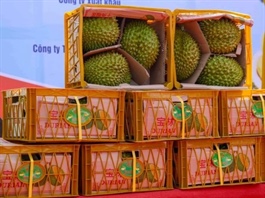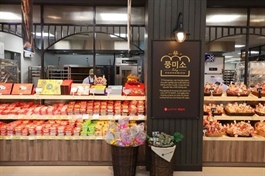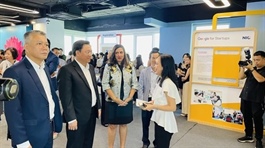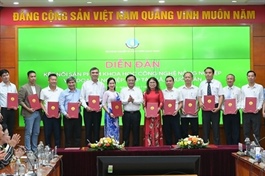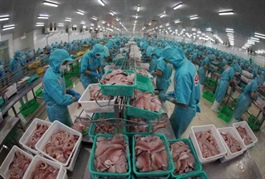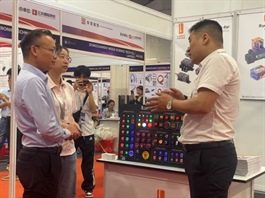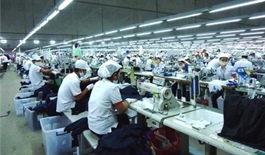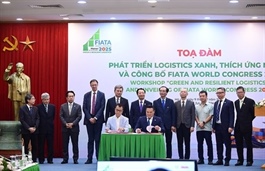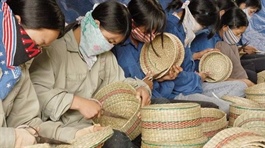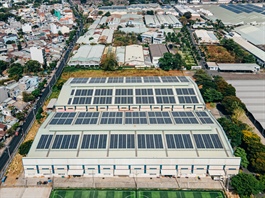Aquaculture groups wrap up funding
Aquaculture groups wrap up funding
More local and foreign companies are making new investments in sustainable aquaculture farming.

In mid-June, US-based Australis Aquaculture revealed that it was ready to inject a further $800 million into Vietnam’s sustainable aquaculture over the coming years. The company has already invested $200 million in barramundi farming in the country.
Josh Goldman, co-founder and CEO of Australis Aquaculture, told VIR that the additional money would be allocated for farming and processing infrastructure, biomass creation, research and development, and the renewal of biomass over time.
“Beyond our current base of operations in the south-central province of Khanh Hoa, we are working to establish Vietnam’s first farms in the open ocean, as well as a second regional hub in Kien Giang province,” Goldman said.
To develop its sustainable aquaculture model, Australis Aquaculture has spent a decade adapting the technology of the global salmon farming industry to tropical conditions for barramundi in Vietnam.
“Suitable salmon farming ocean sites are almost fully utilised globally. Climate change is contacting the available areas, and there is a 500,000-tonne supply shortfall projected over the coming decade,” Goldman said.
“Our approach is to leverage salmon industry knowledge and build the supply and demand for barramundi in key markets globally with the aim of establishing barramundi as a tropical salmon. Like salmon, this is a very high-quality product enjoyed by consumers across markets, which can play a role in stabilising seafood supply as wild catches decline. This requires a long-term focus to overcome many challenges in establishing a new production sector and educating consumers in our target markets.”
Meanwhile, Tepbac, Vietnam’s aquaculture startup, has so far wrapped up investments worth $2.4 million. The startup also has a plan to raise $10 million in the next funding round to scale up its business and build an ecosystem to support shrimp farmers.
Tran Duy Phong, founder and CEO of Tepbac, said that sustainable development has already gained increased attention in the export markets, and this has required Vietnamese shrimp farmers to change models to meet the export requirements. Nevertheless, most farmers are now struggling to generate profits from shrimp farming, so they have not yet taken sustainability into consideration.
“Shrimp farmers are the most important link in the aquaculture value chain towards sustainable development. However, they have an average higher risk of up to 60 per cent of shrimp crop failures, which results in wasteful resources. Farmers are betting on shrimp farming, rather than relying on statistics or tried-and-tested methods,” Phong said.
Tepbac develops automation technologies to address basic issues such as feeding, saving electricity, and mitigating pollution, like automatic environmental measuring devices, automatic feeders, and automatic control cabinets. The company aims to build an ecosystem and value chain to reduce the rate of crop failures to 25 per cent. The startup also perfected a concentrated farming model that helps manage environmental impacts and is completely antibiotic-free.
Skretting Vietnam, a Norwegian aquafeed company, has been focused on energy reduction to empower sustainable aquaculture. In 2023, the company completely replaced its old Long An production site with a state-of-the-art facility, switching from coal to biofuel at the same time. The company achieved its lowest energy per tonne performance in the last half of 2023, and the record lows are expected to continue in 2024.
US agribusiness giant Cargill and the Asia Society for Social Improvement and Sustainable Transformation, a foreign non-governmental organisation, began implementing the Aqua Xanh project in Ca Mau province in the Mekong Delta from May. The project, set for at least the next two years, aims to build climate resilience in the aquaculture industry through sustainable aquaculture practices that apply environmentally friendly sci-tech.
Likewise, shrimp processor and exporter Minh Phu Seafood Corporation is creating a closed-loop value chain that includes breeding, feeding, farming, processing, distribution, and consumption. Despite possessing large-scale farming areas spanning over 1,200 hectares, Minh Phu maintains its 50 per cent autonomy in raw materials.
The group collaborates with farmers to establish concentrated shrimp farming areas. Consequently, it not only produces low-cost input breeding supplies, but also aids farmers in sustainable wealth accumulation.
The National Programme on Aquaculture Development towards 2030 was issued in mid-2022, outlining a development plan for the fisheries sector and aquaculture, including targets for two five-year periods. The total production of aquatic animals is expected to reach 202 million tonnes in 2030, of which aquaculture should contribute 106 million tonnes.
To achieve these goals, the government is encouraging domestic firms to mobilise funds from foreign donors and international organisations. Foreign direct investment in building and upgrading aquaculture infrastructure should be prioritised. This strategy is believed to help the sector meet the requirements of environmental protection, sustainable production, and food safety.
Commenting on the trend of companies switching to sustainable aquaculture, Goldman from Australis Aquaculture said that Vietnamese producers are very entrepreneurial.
“Many have already engaged in certification programmes such Best Aquaculture Practices and the Aquaculture Stewardship Council to shrink their footprint and align with global standards,” he said. “The demand for sustainable products will increase in the United States and European markets in time, so I would expect to see an increasing focus on the importance of sustainability and innovation-driven approaches.”




